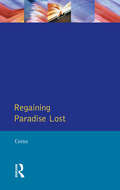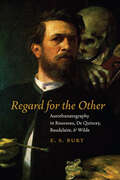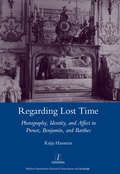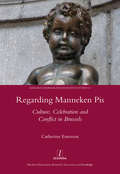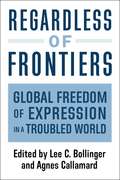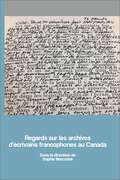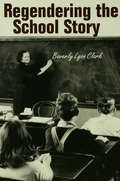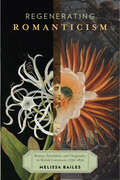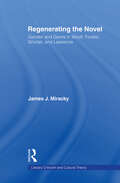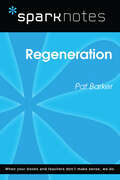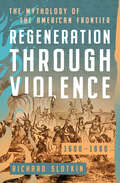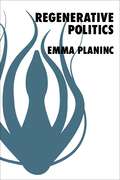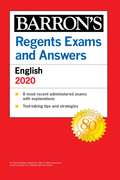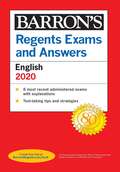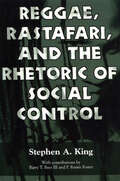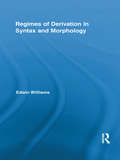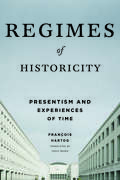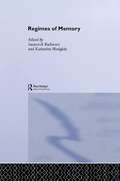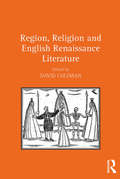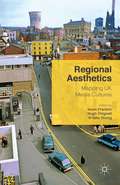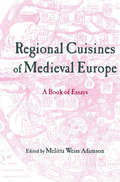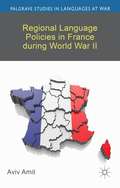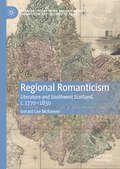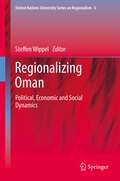- Table View
- List View
Regaining Paradise Lost (Longman Medieval and Renaissance Library)
by Thomas N. CornsParadise Lost is not merely the masterpiece of John Milton (1608-74) but a turning point in style and form, which had a profound influence on the poetry of the following century. Divided into two parts, this major survey begins by discussing the revolutionary characteristics of Paradise Lost in the context of contemporary literary norms and examines the theological, psychological, stylistic and narrative innovation in the poem. It then provides a fuller account of the complex, and now obscure political, and theological issues and other issues that Milton's poem addresses and sought to resolve. It concludes by examining the themes discussed in the light of the influence of the poem on the tradition of English literature.
Regard for the Other: Autothanatography in Rousseau, De Quincey, Baudelaire, and Wilde
by E.S. BurtAlthough much has been written on autobiography, the same cannot be said of autothanatography, the writing of one's death. This study starts from the deconstructive premise that autobiography is aporetic, not or not only a matter of a subject strategizing with language to produce an exemplary identity but a matter also of its responding to an exorbitant call to write its death. The I-dominated representations of particular others and of the privileged other to whom a work is addressed, must therefore be set against an alterity plaguing the I from within or shadowing it from without. This alterity makes itself known in writing as the potential of the text to carry messages that remain secret to the confessing subject. Anticipation of the potential for the confessional text to say what Augustine calls "the secret I do not know," the secret of death, engages the autothanatographical subject in a dynamic, inventive, and open-ended process of identification. The subject presented in these texts is not one that has already evolved an interior life that it seeks to reveal to others, but one that speaks to us as still in process. Through its exorbitant response, it gives intimations of an interiority and an ethical existence to come. Baudelaire emerges as a central figure for this understanding of autobiography as autothanatography through his critique of the narcissism of a certain Rousseau, his translation of De Quincey's confessions, with their vertiginously ungrounded subject-in-construction, his artistic practice of self-conscious, thorough-going doubleness, and his service to Wilde as model for an aporetic secrecy. The author discusses the interruption of narrative that must be central to the writing of one's death and addresses the I's dealings with the aporias of such structuring principles as secrecy, Levinasian hospitality, or interiorization as translation. The book makes a strong intervention in the debate over one of the most-read genres of our time.
Regarding Lost Time: Photography, Identity and Affect in Proust, Benjamin, and Barthes
by Katja HausteinWhat is autobiography and how does it transform in the age of technological reproducibility? Katja Haustein discusses this question as it relates to photography and the role of emotion in Marcel Proust's In Search of Lost Time (1909-22), Walter Benjamin's Berlin Childhood around 1900 (1932-38), and Roland Barthes's Roland Barthes (1977) and Camera Lucida (1980). In her close critical readings, Haustein provides the first comprehensive comparative analysis of these popular works, mapping them against little-studied textual, visual and aural material, some of which has only recently become accessible. In this way, her book opens new avenues in scholarship dedicated to three outstanding twentieth-century writers and contributes to a field of critical inquiry that is still in the making: the history of autobiography in the light of a history of the gaze.
Regarding Manneken Pis: Culture, Celebration and Conflict in Brussels
by Catherine EmersonManneken Pis, a fountain featuring a bronze child urinating, has stood on the same Brussels street corner since at least the mid-fifteenth century. Since there is no consensus on its meaning, it has been used to express many different readings of social relations in a complex city and nation state. It has formed part of the festival culture of the city - from royal entries to gay pride - but has also been exploited in conflicts arising out of war and occupation, and the tensions inherent in modern Belgium. Drawing on archives, histories, police reports, devotional literature, ephemera and a wealth of other sources, Catherine Emerson examines how one smaller-than-lifesized water source has come to embody a certain sort of Brussels identity.
Regardless of Frontiers: Global Freedom of Expression in a Troubled World
by Lee C. Bollinger and Agnès CallamardThe United Nations’ Universal Declaration of Human Rights in 1948 proclaimed a vision of freedom of expression exercised regardless of frontiers. Nonetheless, laws and norms regarding the freedom or limits of expression are typically established and understood at the national level. In today’s interconnected world, newfound threats to free expression have suddenly arisen. How can this fundamental right be secured at a global level?This volume brings together leading experts from a variety of fields to critically evaluate the extent to which global norms on freedom of expression and information have been established and which actors and institutions have contributed to their diffusion. The authors also consider ongoing and new challenges to these norms, from conflicts over hate speech and the rise of populism to authoritarian governments, as well as the profound disruption introduced by the internet. Together, the essays lay the groundwork for an international legal doctrine on global freedom of expression that considers issues such as access to government-held information, media diversity, and political speech. As the world risks renouncing previous commitments to the freedom of expression, Regardless of Frontiers serves as a timely reminder of just how much is at stake and what needs protecting.
Regards sur les archives d’écrivains francophones au Canada (Archives des lettres canadiennes)
by Sophie MarcotteIntégrer les archives d’un écrivain – ses carnets, son journal personnel, sa correspondance, les avant-textes de ses œuvres publiées, voire ses notes de lecture – dans l’analyse de son œuvre canonique permet, on le sait, d’éclairer celle-ci autrement, d’en dégager un sens jusque-là inaccessible. Au Canada, même si quelques initiatives d’envergure se sont développées au cours des vingt dernières années, le versant francophone des archives d’écrivains est demeuré peu exploré par les chercheurs, surtout en ce qui concerne les corpus hors Québec. Cet ouvrage propose un état présent des recherches menées dans plusieurs fonds d’archives et des études portant sur différents corpus ponctuels composés des avant-textes et autres documents appartenant aux dossiers génétiques d’œuvres publiées. Si les études sur le corpus québécois (Roy, Guèvremont, Hébert, Ducharme, Aquin, Tremblay, etc.) dominent en nombre, celles portant sur l’Ontario (Poliquin), le Manitoba (Léveillé) et l’Acadie (Leblanc) sont aussi représentées. Les différentes collaborations permettent de mettre en lumière la multiplicité des perspectives sous lesquelles il est possible d’envisager les questionnements liés aux fonds d’archives – notamment génétique, thématique, sémiotique, historique, sociologique, diaristique –, tout en faisant ressortir la diversité et la richesse des différents fonds et les problèmes et lacunes qui leur sont inhérents. Une coédition avec le Centre de recherche en civilisation canadienne-française. Publié en français
Regendering the School Story: Sassy Sissies and Tattling Tomboys (Children's Literature and Culture #Vol. 3)
by Beverly Lyon ClarkFirst published in 1996. Routledge is an imprint of Taylor & Francis, an informa company.
Regenerating Romanticism: Botany, Sensibility, and Originality in British Literature, 1750–1830
by Melissa BailesWithin key texts of Romantic-era aesthetics, William Wordsworth, S. T. Coleridge, and other writers and theorists pointed to the poet, naturalist, and physician Erasmus Darwin as exemplifying a lack of originality and sensibility in the period’s scientific literature--the very qualities that such literature had actually sought to achieve. The success of this strawman tactic in establishing Romantic-era principles resulted in the historical devaluation of numerous other, especially female, imaginative authors, creating misunderstandings about the aesthetic intentions of the period’s scientific literature that continue to hinder and mislead scholars even today. Regenerating Romanticism demonstrates that such strategies enabled some literary critics and arbiters of Romantic-era aesthetics to portray literature and science as locked in competition with one another while also establishing standards for the literary canon that mirrored developing ideas of scientific or biological sexism and racism. With this groundbreaking study, Melissa Bailes renovates understandings of sensibility and its importance to the late eighteenth- and early nineteenth-century movement of scientific literature within genres such as poetry, novels, travel writing, children’s literature, and literary criticism that obviously and technically engage with the natural sciences.
Regenerating the Novel: Gender and Genre in Woolf, Forster, Sinclair, and Lawrence (Literary Criticism and Cultural Theory)
by James J. MirackyFirst Published in 2003. Routledge is an imprint of Taylor & Francis, an informa company.
Regeneration (SparkNotes Literature Guide Series)
by SparkNotesRegeneration (SparkNotes Literature Guide) by Pat Barker Making the reading experience fun! Created by Harvard students for students everywhere, SparkNotes is a new breed of study guide: smarter, better, faster. Geared to what today's students need to know, SparkNotes provides: *Chapter-by-chapter analysis *Explanations of key themes, motifs, and symbols *A review quiz and essay topicsLively and accessible, these guides are perfect for late-night studying and writing papers
Regeneration Through Violence: The Mythology of the American Frontier, 1600–1860 (Mythology of the American West)
by Richard SlotkinNational Book Award Finalist: A study of national myths, lore, and identity that &“will interest all those concerned with American cultural history&” (American Political Science Review).Winner of the American Historical Association&’s Albert J. Beveridge Award for Best Book in American History In Regeneration Through Violence, the first of his trilogy on the mythology of the American West, historian and cultural critic Richard Slotkin demonstrates how the attitudes and traditions that shape American culture evolved from the social and psychological anxieties of European settlers struggling in a strange new world to claim the land and displace Native Americans. Using the popular literature of the seventeenth, eighteenth, and early nineteenth centuries—including captivity narratives, the Daniel Boone tales, and the writings of Hawthorne, Thoreau, and Melville—Slotkin traces the full development of this myth. &“Deserves the careful attention of everyone concerned with the history of American culture or literature. &”—Comparative Literature &“Slotkin&’s large aim is to understand what kind of national myths emerged from the American frontier experience. . . . [He] discusses at length the newcomers&’ search for an understanding of their first years in the New World [and] emphasizes the myths that arose from the experiences of whites with Indians and with the land.&” —Western American Literature
Regenerative Politics (New Directions in Critical Theory #98)
by Emma PlanincCritics of liberal democracy from both the left and right view rights not as protectors of freedom but as impediments to self-determination and call for radically regenerative political alternatives. Liberals respond to these challenges by reasserting that universal rights are self-evident, intentionally foreclosing the possibility of remaking the political order. Regenerative Politics makes a bold intervention into this fraught landscape, arguing that the survival of rights depends on abandoning their claims to self-evidence.Emma Planinc argues that liberal democracies must open themselves up to a regenerative politics that accepts all claims against political convention as self-determinative—including those that desire the rejection of rights or the overturning of liberal democracies themselves. Bringing together scholarship on race, democracy, liberalism, fascism, and the far right with an intellectual history of the Enlightenment and the French Revolution and a novel account of human nature, Regenerative Politics offers a new political theory for the revitalization of politics. Planinc shows that liberal democracies can arm themselves against extreme challenges by remaining perpetually open to the reconstitution of rights, restoring the capacity for human beings to determine themselves in the world.
Regents English Power Pack Revised Edition (Barron's Regents NY)
by Carol ChaitkinBarron&’s two-book Regents English Power Pack provides comprehensive review, actual administered exams, and practice questions to help students prepare for the English Regents exam. All Regents test dates for 2020 have been canceled. Currently the State Education Department of New York has released tentative test dates for the 2021 Regents. The dates are set for January 26-29, 2021, June 15-25, 2021, and August 12-13th. This edition includes:Regents Exams and Answers: EnglishEight actual, administered Regents exams so students have the practice they need to prepare for the testReview questions grouped by topic, to help refresh skills learned in classThorough explanations for all answersScore analysis charts to help identify strengths and weaknessesStudy tips and test-taking strategiesLet&’s Review Regents: EnglishComprehensive review of all topics on the testExtra practice questions with answersOne actual, administered Regents English exam with answer keyThe Power Pack includes two volumes for a savings of $4.99.
Regents Exams and Answers: English 2020 (Barron's Regents)
by Carol ChaitkinBarron’s Regents Exams and Answers: English 2020 provides essential review for students taking the English Regents, including actual exams administered for the course, thorough answer explanations, and comprehensive review of all topics. This edition features: Eight actual, administered Regents exams so students can get familiar with the test, Comprehensive review questions grouped by topic, to help refresh skills learned in class, Thorough explanations for all answers, Score analysis charts to help identify strengths and weaknesses, Study tips and test-taking strategies. Looking for additional practice and review? Check out Barron’s Regents English Power Pack 2020 two-volume set, which includes et’s Review Regents: English 2020 in addition to the Regents Exams and Answers: English 2020 book.
Regents Exams and Answers: English Revised Edition (Barron's Regents NY)
by Carol ChaitkinBarron&’s Regents Exams and Answers: English provides essential review for students taking the English Regents, including actual exams administered for the course, thorough answer explanations, and comprehensive review of all topics. All Regents test dates for 2020 have been canceled. Currently the State Education Department of New York has released tentative test dates for the 2021 Regents. The dates are set for January 26-29, 2021, June 15-25, 2021, and August 12-13th. This edition features:Eight actual, administered Regents exams so students can get familiar with the testComprehensive review questions grouped by topic, to help refresh skills learned in classThorough explanations for all answersScore analysis charts to help identify strengths and weaknessesStudy tips and test-taking strategiesLooking for additional practice and review? Check out Barron&’s Regents English Power Pack two-volume set, which includes Let&’s Review Regents: English in addition to the Regents Exams and Answers: English book.
Reggae, Rastafari, and the Rhetoric of Social Control
by Stephen A. KingWho changed Bob Marley’s famous peace-and-love anthem into “Come to Jamaica and feel all right?” When did the Rastafarian fighting white colonial power become the smiling Rastaman spreading beach towels for American tourists? Drawing on research in social movement theory and protest music, Reggae, Rastafari, and the Rhetoric of Social Control traces the history and rise of reggae and the story of how an island nation commandeered the music to fashion an image and entice tourists. Visitors to Jamaica are often unaware that reggae was a revolutionary music rooted in the suffering of Jamaica’s poor. Rastafarians were once a target of police harassment and public condemnation. Now the music is a marketing tool, and the Rastafarians are no longer a “violent counterculture” but an important symbol of Jamaica’s new cultural heritage. This book attempts to explain how the Jamaican establishment’s strategies of social control influenced the evolutionary direction of both the music and the Rastafarian movement. From 1959 to 1971, Jamaica’s popular music became identified with the Rastafarians, a social movement that gave voice to the country’s poor black communities. In response to this challenge, the Jamaican government banned politically controversial reggae songs from the airwaves and jailed or deported Rastafarian leaders. Yet when reggae became internationally popular in the 1970s, divisions among Rastafarians grew wider, spawning a number of pseudo-Rastafarians who embraced only the external symbolism of this worldwide religion. Exploiting this opportunity, Jamaica’s new Prime Minister, Michael Manley, brought Rastafarian political imagery and themes into the mainstream. Eventually, reggae and Rastafari evolved into Jamaica’s chief cultural commodities and tourist attractions.
Regimes of Derivation in Syntax and Morphology (Routledge Leading Linguists)
by Edwin WilliamsRegimes of Derivation in Syntax and Morphology presents a theory of the architecture of the human linguistic system that differs from all current theories on four key points. First, the theory rests on a modular separation of word syntax from phrasal syntax, where word syntax corresponds roughly to what has been called derivational morphology. Second, morphosyntax (corresponding to what is traditionally called "inflectional morphology") is the immediate spellout of the syntactic merge operation, and so there is no separate morphosyntactic component. There is no LF (logical form) derived; that is, there is no structure which 'mirrors' semantic interpretation ("LF"); instead, semantics interprets the derivation itself. And fourth, syntactic islands are derived purely as a consequence of the formal mechanics of syntactic derivation, and so there are no bounding nodes, no phases, no subjacency, and in fact no absolute islands. Lacking a morphosyntactic component and an LF representation are positive benefits as these provide temptations for theoretical mischief. The theory is a descendant of the author's "Representation Theory" and so inherits its other benefits as well, including explanations for properties of reconstruction, remnant movement, improper movement, and scrambling/scope interactions, and the different embedding regimes for clauses and DPs. Syntactic islands are added to this list as special cases of improper movement.
Regimes of Historicity: Presentism and Experiences of Time (European Perspectives: A Series in Social Thought and Cultural Criticism)
by François HartogFrançois Hartog explores crucial moments of change in society's "regimes of historicity," or its ways of relating to the past, present, and future. Inspired by Hannah Arendt, Reinhart Koselleck, and Paul Ricoeur, Hartog analyzes a broad range of texts, positioning The Odyssey as a work on the threshold of historical consciousness and contrasting it with an investigation of the anthropologist Marshall Sahlins's concept of "heroic history." He tracks changing perspectives on time in Chateaubriand's Historical Essay and Travels in America and sets them alongside other writings from the French Revolution. He revisits the insights of the French Annales School and situates Pierre Nora's Realms of Memory within a history of heritage and today's presentism, from which he addresses Jonas's notion of our responsibility for the future. Our presentist present is by no means uniform or clear-cut, and it is experienced very differently depending on the position we occupy in society. We are caught up in global movement and accelerated flows, or else condemned to the life of casual workers, living from hand to mouth in a stagnant present, with no recognized past, and no real future either (since the temporality of plans and projects is inaccessible). The present is therefore experienced as emancipation or enclosure, and the perspective of the future is no longer reassuring, since it is perceived not as a promise, but as a threat. Hartog's resonant readings show us how the motor of history(-writing) has stalled and help us understand the contradictory qualities of our contemporary presentist relation to time.
Regimes of Memory (Routledge Studies in Memory and Narrative)
by Susannah Radstone Katharine HodgkinA focus on memory has come to prominence across a wide range of disciplines. History, literature, philosophy, anthropology, and cultural studies have placed memory at the heart of their interrogations of subjectivity, narrative, time and imagination. At the same time, memory has emerged as a central theme and preoccupation in popular literature, film and television, and the emergence of memory as an academic theme cannot be separated from its prominence in the wider culture. This volume represents, explores and interrogates the current developments, engaging directly with the place of memory in culture, and with memory's meaning's and history.
Region, Religion and English Renaissance Literature
by David ColemanRegion, Religion and English Renaissance Literature brings together leading scholars of early modern literature and culture to explicate the ways in which both regional and religious contexts inform the production, circulation and interpretation of Renaissance literary texts. Examining texts by a wide variety of early modern writers - including Edmund Spenser, Lodowick Lloyd, Richard Nugent, Thomas Middleton and John Webster, Richard Montagu, and John Milton - the contributors to this volume enhance our understanding of the complex cultural contexts of early modern Anglophone writing.
Regional Aesthetics: Mapping UK Media Cultures
by Hugh Chignell Ieuan Franklin Kristin SkoogThis book is about forms of media that have reflected or increased consciousness of - a sense of place or a regional identity. From landscape painting in the Romantic era to newspaper coverage of devolution, the chapters explore, through contextualized case studies, the aesthetics of a wide range of local, regional and grassroots forms of media.
Regional Cuisines of Medieval Europe: A Book of Essays (Garland Medieval Casebooks)
by Melitta Weiss AdamsonExpert food historians provide detailed histories of the creation and development of particular delicacies in six regions of medieval Europe-Britain, France, Italy, Sicily, Spain, and the Low Countries.
Regional Language Policies in France during World War II
by Aviv AmitDuring Germany's occupation of France in WWII, French regional languages became a way for people to assert their local identities. This book offers a detailed historical sociolinguistic analysis of the various language policies applied in France's regions (Brittany, Southern France, Corsica and Alsace) before, during and after WWII.
Regional Romanticism: Literature and Southwest Scotland, c.1770–1830 (Palgrave Studies in the Enlightenment, Romanticism and Cultures of Print)
by Gerard Lee McKeeverThis book tracks the rise of modern cultural regionalism across the turn of the nineteenth century. Attending specifically to literature and literary culture, it examines how a particular region—southwest Scotland—was reimagined between 1770 and 1830. Regionalisms were a vital, emergent force in this period, in dialogue with the local, the national, the transnational and the imperial. In the case of southwest Scotland, the literary inscription of the region was generated in a blossoming periodical press; by visitors like Dorothy Wordsworth and John Keats; by resident icon Robert Burns; by homesick emigrants such as Allan Cunningham; by adventurers, colonialists and pirates looking back from within and beyond the formal limits of empire; by the unprecedented success of Walter Scott; and by many others navigating the opportunities presented by rapidly evolving economic, environmental and infrastructural conditions. Regional Romanticism illuminates a neglected aspect of anglophone literary history, acknowledging regions and regionalism as a primary frame of reference in late eighteenth and early nineteenth-century culture.
Regionalizing Oman: Political, Economic and Social Dynamics
by Steffen WippelThis volume addresses the historical structures and current dynamics of Oman's regionalization processes and their political, economic and social dimensions. It is based on an interdisciplinary and trans-regional dialogue between scholars from different social sciences and area studies such as political science, economics, management, economic and social geography, history, social anthropology and linguistics as well as Middle East/West Asian, gulf and African studies, and develops four major axes of research: - Oman's integration into global and regional flows of goods, capital, people and ideas; - The multi-scaled political negotiation of such integration (or disintegration) processes; - Consequences of suchlike processes and forms of regionalization for (translocal) actors; - Ideas and strategic communication of regional belonging and the constitution of regions. Each chapter deals with one or more of these issues. Part I deals with concepts of regionalisation and region-building and presents different approaches that accentuate certain dimensions of these processes and come from different disciplinary backgrounds. Part II focuses on the translocal, transnational and (trans)regional movement of people, their practices and imaginations, be they contemporary labour in- and out-migrants, returnees from Eastern Africa or nomadic tribal members. Part III takes a closer look particularly at economic issues and regionalisation processes that are mainly based on multiple trade links, regional development policies or politics of regionalism. Part IV analyses political and socio-cultural issues in regional and global perspectives.
